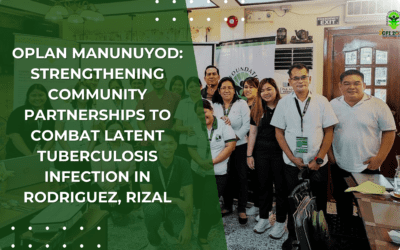𝗜𝗻𝘁𝗿𝗼𝗱𝘂𝗰𝗶𝗻𝗴 𝗢𝗽𝗹𝗮𝗻 𝗠𝗮𝗻𝘂𝗻𝘂𝘆𝗼𝗱: 𝗔 𝗖𝗼𝗺𝗺𝘂𝗻𝗶𝘁𝘆-𝗕𝗮𝘀𝗲𝗱 𝗔𝗽𝗽𝗿𝗼𝗮𝗰𝗵 𝘁𝗼 𝗟𝗮𝘁𝗲𝗻𝘁 𝗧𝘂𝗯𝗲𝗿𝗰𝘂𝗹𝗼𝘀𝗶𝘀 𝗜𝗻𝗳𝗲𝗰𝘁𝗶𝗼𝗻The CFI Oplan Manunuyod team recently met with stakeholders in Rodriguez, Rizal, to partner with them in the implementation of the project about community-based, patient-centered...
OPLAN
The Philippines is one of the 30 high TB burden countries in the world, accounting for 7% of the global total and equivalent to 638 cases per 100,000 population. In the National Capital Region, the most densely populated region and largest metropolitan area in the Philippines, the total number of diagnosed TB cases (all forms) in 2022 is 95,424 which is approximately 13% of the national estimated TB cases (737,000) of the same year. Achieving the target set in the TB Program indicator performance is necessary to reduce TB burden. However, the 2022 Department of Health Joint Program Review (JPR) for the Philippines’ National TB and HIV Programs showed that TB performance in 2021 is below target. Indicators on TB preventive therapy (TPT) is the “weakest link” across the care cascade. Efforts have been focused on screening, diagnosis, and treatment; unfortunately, prevention through TPT has been overlooked. As with all public health programs, it is the health workers at the local health units including volunteer BHWs who carry out the programmatic management of latent TB infection (LTBI) management. Because of the numerous health programs that have to be implemented by a limited workforce, public health workers experience work overload, and thus, execution of some programs, including LTBI management, are done less ideally. Consequently, TPT coverage lags behind which ultimately compromises outcomes in other parts of the TB cascade of care.
To lessen the workload of health workers at the local health centers and increase TPT coverage, this project aims to train members of a community-based organization (CBO) in the programmatic management of LTBI to be community navigators in select local health centers. A review of existing CBOs will be done following set criteria on the organization’s capacity, experiences, and social position in the community. Specific sites in NCR will be determined with the Metro Manila Center for Health Development (MMCHD) in line with their perceived needs and existing strategies on TB elimination along with other criteria.
Asymptomatic and symptomatic household and close contacts of patients with TB and the trained community navigators are the primary direct beneficiaries of the project. Indirect beneficiaries include the MMCHD, healthcare workers at the CHO and local health centers, barangay health workers, individuals with TB, and community members. For the project’s sustainability, It will be suggested to key authorities to consider contracting the trained community navigators after the project ends. A formal partnership with the identified CBO as a provider of community navigators will also be proposed to the concerned offices before the project ends. In the future, the project can be explored as a model for engaging private providers (i.e. CBO) to deliver quality health services, specifically LTBI management, in light of Universal Health Care.

